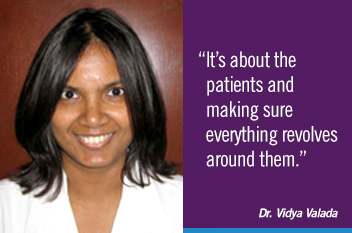Running a Small Practice in the Big Apple
Dr. Vidya Valada is a proud New Yorker. Born and raised in India, Vidya moved to New York City in the 1990s to complete her residency in internal medicine. She speaks briskly and enthusiastically about practicing medicine, and it quickly becomes apparent that she feels right at home among her fellow New Yorkers. "Most of my patients are like me," she says. "They work very hard, they put their heart into it, and they love what they do. The whole energy is amazing, and I think we all feed off of each other." 
After working in hospitals in the city for more than a decade, Vidya decided to open her own primary care practice in midtown Manhattan in 2006. The zest she has for her work is infectious and also essential for keeping up with her grueling schedule as the sole physician in the practice.
A typical day for her begins at 5:00 a.m. and sometimes includes stopping by the hospital to check on her patients before arriving to her office at 7:00 a.m. She sees 20 to 25 patients until 4:30 in the afternoon. After she commutes home outside of the city, her work begins anew—she calls patients to give them their exam results, reviews their medical charts, and updates their electronic health records (EHRs), often until 10:30 or 11:00 at night. On the weekend, she conducts what she calls her "pajama rounds"—she reviews lab results, responds to messages from patients through the practice's online portal, and finishes updating patients' health records.
Vidya estimates that EHR and communication activity outside of her normal office hours adds 30‑40 hours to her workload a week for which she does not get paid. "This is our life as doctors now," she explains. "And it's not about reimbursement as much as what it takes if you want to do a proper job of taking care of your patients." She adds, "I'm not sure how much anybody can sustain this kind of lifestyle. But I enjoy it, so that makes it sustainable."
"…excellence is more achievable when we can make the changes needed to give exceptional care to our patients."
Although setting work-life boundaries can be challenging, Vidya recognizes the importance of taking care of her own health so she can provide the best possible care to her patients. She makes a point of carving out time each day to do an hour of kickboxing and to eat dinner with her husband and two teenage children.
Given her intense schedule, it's no surprise that she credits her team of staff—which includes two administrative assistants and a medical assistant—with helping to keep the office running smoothly. Her vision for the practice is simple. "It's about the patients and making sure everything revolves around them," she says. She and her team enjoy seeing patients from all walks of life, from young professionals working in the city to families with diverse backgrounds who come to the practice for their routine care.
An advantage of running a small shop is that when Vidya and her staff see a way to improve care, they can implement changes quickly and efficiently. For example, by reviewing data reports from her practice, she realized that her staff was not consistently including body mass index or "BMI" (a health indicator based on height and weight) in patients' health records—BMI was only being added to 40 percent of patient records. Vidya assembled her team to raise this issue and emphasize the need to capture that information. When she reviewed the same data a year later, BMI was included in 98 percent of patients' records. While she celebrates that success, she recognizes the importance of continuous improvement. "My practice is a work in progress," Vidya says. "I find that excellence is more achievable when we can make the changes needed to give exceptional care to our patients."
This story is courtesy of HealthyHearts NYC, the EvidenceNOW New York City Cooperative.



